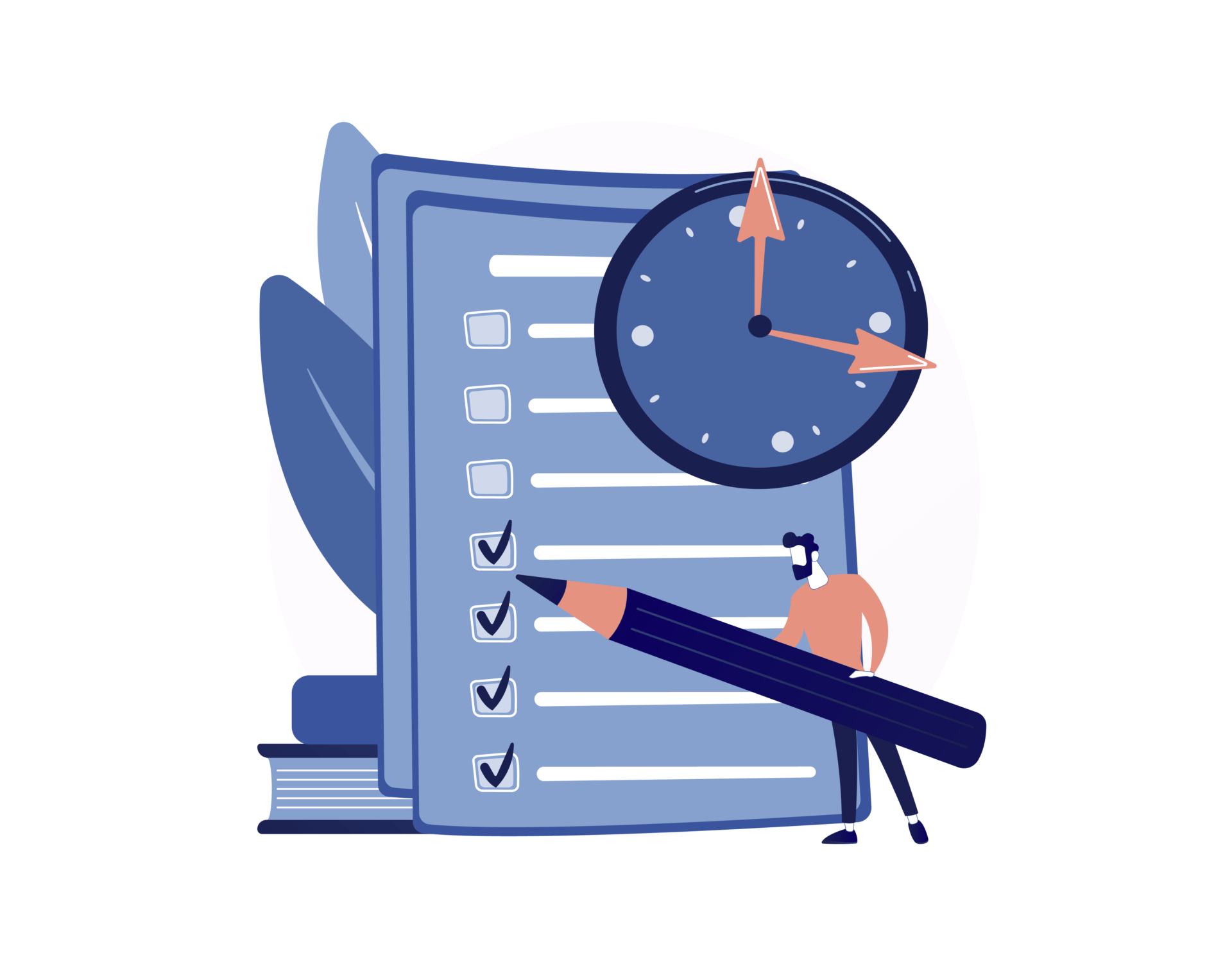It’s no good just willing yourself to be more productive. Do that and you’ll continue wondering where all the hours went. What you need is a productivity strategy.
These top 20 productivity tips will help you improve your focus, motivation, and organization to help you get more done every day.
Productivity Tips at Work
Let’s start with some general productivity tips for work. You can apply these to just about any situation — no matter your role, industry, or work setting.
1. Set Yourself Daily Goals
When you sit down without any clear purpose, it’s easy to feel that the hours just pass you by. To avoid this, decide at the start of each day what you want to achieve. Write these goals down and refer back to them at intervals throughout the day to check that you’re still on track.
Note: your daily goals is not a to-do list. The list should consist of small goals or valuable activities that will bring you closer to your larger objectives. For instance, some may be activities that will take your company to the next level or help you progress in your career.
Throughout the day, check off the tasks you complete. This will give you a sense of accomplishment and show you exactly what you’ve achieved.
2. Sleep Enough
It’s impossible to be productive if you’re exhausted. You may feel compelled to stay up late into the night to finish your work (particularly if you’ve had an unproductive day), but this will only make it even more difficult to get anything done tomorrow.
When you start the day well-rested, you’ll find that you finish tasks much faster. Plus, you’ll make better decisions, which is crucial both for your career and for the success of your company.
3. Exercise
Another way to keep your energy levels high is to exercise regularly. There are even exercises you can do at your desk.
4. Eat Well
It’s impossible to focus when you’re hungry. Instead of snacking on empty calories, stay satiated throughout the day by eating meals containing plenty of healthy carbohydrates and protein. It may seem like more effort to eat balanced meals, but you’ll soon notice a difference in your concentration.
5. Use Self-Motivational Tactics
There are several effective ways to motivate yourself.
The first involves imagining yourself doing the activity. You could use this tactic for something you dread or something important you want to happen. Imagining the event taking place will improve your chances of success.
Another technique is to make self-affirming statements. Tell yourself that you can complete a project that feels difficult or remind yourself of how far you’ve already come.
Finally, think about what will happen after you’ve pushed through. This could be something as simple as being able to move onto an activity you do enjoy or even a new opportunity for your business.
6. Divide Projects into Tasks
A large project is always going to seem impossible if you look at it as one giant task. By splitting the project into tasks that take around 20 minutes to complete, you can see where to start and find motivation to begin. Once you’ve made some progress, aspects that once seemed unmanageable become quite straightforward.
Productivity Tips for Working from Home
Next, we have some specific productivity tips for remote workers who need to overcome a lack of self-motivation and distractions at home.
7. Figure Out When You’re Most Focused
Working from home gives you more flexibility than traditional office workers. You can use this to your advantage to improve your productivity.
One thing you can do is create a schedule around your own working style. For instance, if you discover that you never get anything done until after 11 a.m., work from 11 to 7 instead of 9 to 5.
Some people, of course, don’t have this much choice — you may need to be available at particular times, there may be meetings you need to attend, or you may have other commitments to fit around. Even so, the likelihood is that you do have a large degree of control over your day. Just figuring out what time of day is best suited for different activities can make a big difference.
For example, some people love to start the day with creative activities like brainstorming. However, it’s best to leave the block of time right after lunch to tasks that require less concentration.
In fact, you can go beyond this and consider days of the week as well. Mondays could be the perfect day to focus on the work you enjoy the most —to put you in the right frame of mind for the rest of the week. Fridays are likely to be for wrapping up and reviewing the week that was.
8. Let Others Know Your Schedule
Once you’ve figured out what times you’ll be working and what you’ll be doing at different points in the day or week, you need to let others know. Tell your coworkers when is the best time to reach you. In addition, communicate your schedule with the people you live with. This will ensure they know what times of day you need to work undisturbed.

Time Management Productivity Tips
Whether you’re working at the office or from home, improving your time-management skills will help you see a boost in productivity.
9. Start with the Most Difficult Tasks
It’s always tempting to put off challenging tasks until later. However, this means you may end up needing to rush through them, which is stressful and increases the risk of mistakes. Whenever you have the choice of a difficult task and something more appealing, choose the difficult option. Then, you can save the activity you actually want to do as a reward.
Push yourself to work for just 5 minutes. Often, the hardest part is getting started. Once you’ve committed to that initial 5 minutes, you’ll often find that you’re motivated to continue. Before you know it, you’ll have completed a large chunk, if not all, of the task.
10. Turn Off Notifications
It’s impossible to stick to a schedule if you’re constantly bombarded with notifications. Many notifications are likely unrelated to your job and the vast majority don’t require your immediate attention.
At a minimum, turn off all your personal social media notifications (those related to your business accounts may be necessary to keep on). For periods of deep concentration, set your phone to “do not disturb” mode.
If just turning off notifications proves ineffective — such as if you find yourself heading to the web versions of social media platforms during periods of demotivation — use a website blocker. You have a number of options, each of which has different functionality and is suitable for different browsers and devices.
11. Make Your Schedule in Advance
A time-wasting habit that many people fall victim to is creating their schedule for the day first thing in the morning. It is much better to do this ahead of time — this way, you can get stuck in at the start of the day without deliberating over what to do first. Depending on how far ahead you are able to look, you could create your schedule the day before or even on Friday for the week ahead.
12. Include Free Time in Your Schedule
It’s common to underestimate how long each activity will take. One tactic is to schedule slightly longer than you think you’ll need for each task, but there’s always the risk that you’ll end up filling the extra time just because it’s available.
A better strategy is to include a chunk of free time every day. You can also use this for meetings that go on longer than expected and urgent tasks that come up at the last minute.
13. Take Breaks
Don’t rely on free time for breaks — if you do this, you may end up working continuously all day. Include breaks in your schedule to give yourself some time to relax away from your desk. Breaks only need to last a few minutes, but they should occur at regular intervals throughout the day. Use them to get a glass of water or a cup of coffee, do some stretches, or even take a short walk.
Small Business Productivity Tips
Next, let’s look at some productivity tips for small business owners. There are few people for whom productivity is more important.
14. Write Down Everything You Need to Do
As a small business owner, you have a huge number of things to do — and each day may be completely different. Instead of trying to keep a mental to-do list, write everything down. You can then assign a priority to each task to make sure you finish everything on time.
15. Stop Trying to Do Everything Yourself
When you started your business, you probably had the idea that it would become easier as time went on. In some ways, it may have — you’ve learned from your mistakes and have a base of loyal customers. However, your workload probably keeps getting heavier and it may be difficult to fit everything you need to do into one day.
At a certain point, it will actually become impossible to maintain high productivity. There are simply too many responsibilities to running a business for you to manage alone. If you’ve reached this point, it’s time to start delegating.
The obvious choice is to delegate to your employees, but their schedules may already be full. If hiring another full-time employee is out of your budget, an alternative option is to outsource. Choose whatever tasks are taking up the majority of your time and drawing your attention away from your core business activities. Many small business owners find it makes sense to outsource admin tasks.
16. Talk to Others for Inspiration
One of the most challenging aspects of running a small business is making decisions and coming up with new ideas. When you feel stuck, productivity suffers.
However, you’re never completely alone. Even if you only have a couple employees and one or two outsourced professionals on your team, talking your ideas through with them can help you find inspiration.
Executive and CEO Productivity Tips
Finally, let’s end with some productivity tips just for CEOs and other executives.
17. Learn to Say No
To survive as an executive, you need to learn to say no. If you agree to everything, you’ll find that your schedule quickly becomes full of activities unrelated to your job description, along with meetings there’s no real need for you to attend.
When someone comes to you with a request, take your time to think about it. Decide if it needs to be you who carries out the task or whether attending a meeting has any benefits for you. When you do this, you’ll find that your schedule quickly becomes more manageable.
18. Leave Email Until Later in the Day
If you use your phone as an alarm clock, it can be tempting to look at your email before you’re even out of bed. However, this ruins your morning routine and takes your schedule out of your control.
In fact, you should push yourself to go one step further: only check your email after you’ve been working a few hours. As an executive, you have pressing issues to attend to — your email can wait. You already know exactly what you need to do throughout the day. Only once you’ve finished tackling your top priorities should you read your emails. Then, you can decide which require a timely response and schedule the rest for later.
19. Focus on What You Do Best
It would be even better if you didn’t need to worry about routine tasks like email at all. A top solution is to hire a virtual assistant for executives. Your VA will take care of your inbox for you, letting you know which emails require your attention and even handling some of your correspondence for you.
Plus, a virtual assistant can do much more than email management — a VA can handle just about any task you struggle to find time for along with any activities that fall outside your area of expertise. This could include creating presentations, reporting KPIs, and even acting as a translator for partners or clients in other countries.
20. Learn New Skills
To reach the place you are today, you’ve had to acquire a huge number of skills. However, just because you are an executive doesn’t mean the learning journey is over — far from it! Taking some time now to pick up more skills will pay off in the long term.
For example, simply learning some keyboard shortcuts can shave off some seconds here and there, but it could add up to a few hours over the course of a year. A more time-intensive skill to learn that will save you a huge amount of time is touch typing. The average speed of two-finger typing is only 27 words per minute (wpm), whereas those who use all 10 fingers tend to type at least 50 wpm.
You’ll most likely find that some of these productivity tips resonate with you more than others. To find the best productivity tips for you, experiment with all those that apply to your situation and incorporate whichever lead to results into your routine. Even if you end up adopting just a few good habits, you’ll see a massive difference in your productivity levels.
Of course, it’s impossible to be productive enough if you simply have too much work. Instead of spending your time on monotonous tasks and work you dislike, delegate to a virtual assistant. Schedule a consultation with MYVA360 to discuss your needs and find out what a VA can do for you.





